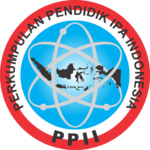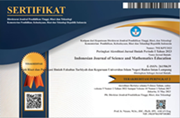Problem-Based Learning to Improve Problem-Solving Skill: Is it Effective Enough?
Abstract
This study aimed to determine the effectiveness of the problem based learning model on the problem solving ability of high school students. This research is a quasy experimental research with the matching only pretest-posttest control group design. The subjects in this study were students of class XI IPA SMA Negeri 1 Ulubelu. The effect size hypothesis test is used to obtain the results of the effectiveness of the PBL model on students’ problem solving abilities. The result of the effect size hypothesis test showed the value of 0.68 in the moderate category. So it can be concluded that the problem-based learning model is effective for improving the problem-solving ability of high school students.
Keywords
Full Text:
PDFReferences
M. Sayyadi, A. Hidayat, and Muhardjito, “Pengaruh Strategi Pembelajaran Inkuiri Terbimbing dan Terhadap Kemampuan Pemecahan Masalah Fisika pada Materi Suhu dan Kalor Dilihat dari Kemampuan Awal Siswa,” J. Inspirasi Pendidik., vol. 6, no. 2, pp. 352–364, 2016.
G. Gunawan, A. Harjono, H. Sahidu, L. Herayanti, N. M. Y. Suranti, and F. Yahya, “Using Virtual Laboratory to Improve Pre-service Physics Teachers’ Creativity and Problem-Solving Skills on Thermodynamics Concept,” J. Phys. Conf. Ser., vol. 1280, no. 5, 2019, doi: 10.1088/1742-6596/1280/5/052038.
M. Hasanah and E. Surya, “Difference in the Abilities of Creative Thinking and Problem Solving of Students in Mathematics by Using Cooperative Learning and Learning ofProblem Solving,” Int. J. Sci. Basic Appl. Res., vol. 34, no. 1, 2017.
A. Panaoura, P. Michael-Chrysanthou, A. Gagatsis, I. Elia, and A. Philippou, “A Structural Model Related to the Understanding of the Concept of Function: Definition and Problem Solving,” Int. J. Sci. Math. Educ., vol. 15, no. 4, pp. 723–740, 2017, doi: 10.1007/s10763-016-9714-1.
M. A. Rasyid, “Profil Berpikir Reflektif Siswa SMP dalam Pemecahan Masalah Pecahan Ditinjau dari Perbedaan Gender,” Kreano, J. Mat. Kreat., vol. 8, no. 2, pp. 171–181, 2017, doi: 10.15294/kreano.v8i2.9849.
S. Psycharis, “Examining the effect of the computational models on learning performance, scientific reasoning, epistemic beliefs and argumentation: An implication for the STEM agenda,” Comput. Educ., vol. 68, pp. 253–265, 2013, doi: 10.1016/j.compedu.2013.05.015.
M. Suryani, L. H. Jufri, and T. A. Putri, “Analisis Kemampuan Pemecahan Masalah Siswa Berdasarkan Kemampuan Awal,” Musharafa J. Pendidik. Mat., vol. 9, no. Januari, pp. 119–130, 2020.
R. Sundayana, “Kaitan antara Gaya Belajar, Kemandirian Belajar, dan Kemampuan Pemecahan Masalah Siswa SMP dalam Pelajaran Matematika,” Mosharafa J. Pendidik. Mat., vol. 5, no. 2, pp. 75–84, 2018, doi: 10.31980/mosharafa.v5i2.262.
L. E. Castro-Fajardo, A. Santamaria, K. L. Bernal-Hernandez, F. A. Gomez-Hernandez MG, and M. C. Garrcia-Cepero, “How Do Education Professionals Understand Creativity? A Study of The Implicit Theories On Creativity In A Sample Of Educators,” J. Educ. Young Sci. Gift., vol. 2, no. 2, pp. 41–41, 2015, doi: 10.17478/jeysg.201429020.
N. Sulistyowati, T. W. Antonius, and S. Woro, “Efektivitas Model Pembelajaran Guided Discovery Learning Terhadap Kemampuan Pemecahan Masalah Kimia,” Universitas Negeri Semarang, 2012.
H. Ardiansyah, “Pengaruh Metode Pembelajaran Brainstroming terhadap Kemampuan Berpikir Kritis berdasarkan Kemampuan Awal Peserta Didik Hamdan,” Indones. J. Econ. Educ., vol. 1, no. 1, pp. 31–42, 2018, doi: 10.17509/jurnalijee.
B. Tompo, A. Ahmad, and M. Muris, “The development of discovery-inquiry learning model to reduce the science misconceptions of junior high school students,” Int. J. Environ. Sci. Educ., vol. 11, no. 12, pp. 5676–5686, 2016.
W. Widiadnyana, W. Sadia, and W. Suastra, “Pengaruh model discovery learning terhadap pemahaman konsep IPA dan sikap ilmiah siswa SMP,” J. Progr. Pascasarj. Univ. Pendidik. Ganesha, vol. 4, no. 1, pp. 1–13, 2014.
W. Wartono, M. N. Hudha, and J. R. Batlolona, “How are the physics critical thinking skills of the students taught by using inquiry-discovery through empirical and theorethical overview?,” Eurasia J. Math. Sci. Technol. Educ., vol. 14, no. 2, pp. 691–697, 2018, doi: 10.12973/ejmste/80632.
H. Y. Purnomo, Mujasam, and I. Yusuf, “Penerapan Model Guided Discovery Learning pada Materi Kalor terhadap Hasil Belajar Kognitif Peserta Didik Kelas VII SMPN 13 PRAFI Mobokwari Papua Barat,” Pancaran, vol. 5, no. 2, pp. 1–14, 2015.
K. W. B. Putra, I. M. A. Wirawan, and G. A. Pradnyana, “Pengembangan E-Modul Berbasis Model Pembelajaran Discovery Learning Pada Mata Pelajaran ‘Sistem Komputer’ Untuk Siswa Kelas X Multimedia Smk Negeri 3 Singaraja,” J. Pendidik. Teknol. dan Kejuru., vol. 14, no. 1, pp. 40–49, 2017, doi: 10.23887/jptk.v14i1.9880.
Sucipta, E. Ahman, and N. Budiwati, “Metode Guided Discovery Learning terhadap Tingkat Berpikir Kritis Siswa Dilihat dari Motivasi Belajar,” Indones. J. Econ. Educ., vol. 1, no. 1, pp. 1–8, 2018, doi: 10.17509/jurnal.
N. W. Ashari and Salwah, “Problem Based Learning (PBL) Dalam Meningkatkan Kecakapan Pembuktian Matematis Mahasiswa Calon Guru,” J. Mat. dan Pendidik. Mat., vol. 2, no. 2, pp. 100–109, 2017.
M. Kuvac and I. Koc, “The Effect of Problem-based Learning on The Metacognitive Awareness of Pre-service Science Teachers,” Educ. Stud., pp. 1–21, 2018.
P. Rini, “Efektivitas Model Problem Based Learning dalam Mereduksi Disparitas Gender pada Capaian Pembelajaran Sains,” J. Ilm. Pendidik. Fis. Al-Biruni, vol. 6, no. 1, p. 57, 2017.
A. Elizabeth and M. M. Sigahitong, “Pengaruh Model Problem Based Learning Terhadap Kemampuan Berpikir Kreatif Peserta didik,” Juranal Pengkaj. Ilmu dan Pembelajaran Mat. dan IPA IKIP Mataram, vol. 6, no. 2, 2018.
Yuberti, S. Latifah, A. Anugrah, A. Saregar, Misbah, and K. Jermsittiparsert, “Approaching Problem-Solving Skills of Momentum and Impulse Phenomena Using Context and Problem-Based Learning,” Eur. J. Educ. Res., vol. 8, no. 4, pp. 1217–1227, 2019, doi: 10.12973/eu-jer.8.4.1217.
E. Sujarwanto, H. A, and Wartono, “Kemampuan Pemecahan Masalah Fisika Pada Modeling Instruction Pada Peserta didik SMA Kelas XI,” Universitas Negeri Malang, 2014.
U. Supraptinah, Budiyono, and S. Sri, “Eksperimentasi Model Pembelajaran Discovery Learning, Problem Based Learning, dan Think-Talk-Write dengan Pendekatan Saintifik Terhadap Kemampuan Pemecahan Masalah Matematika Ditinjau dari Kemandirian Belajar Pes,” Universitas Sebelas Maret, 2015.
H. Pranoto and S. Slamet, “Perbandingan Model Pembelajaran Problem Based Learning dan Guided Discovery Learning terhadap Keaktifan Siswa Kelas X SMA,” Universitas Sebelas Maret, 2017.
DOI: http://dx.doi.org/10.24042/ijsme.v4i1.8674
Refbacks
- There are currently no refbacks.
Copyright (c) 2021 Unit Riset dan Publikasi Ilmiah FTK UIN Raden Intan Lampung

This work is licensed under a Creative Commons Attribution-ShareAlike 4.0 International License.

Indonesian Journal of Science and Mathematics Education is licensed under a Creative Commons Attribution-ShareAlike 4.0 International License.




